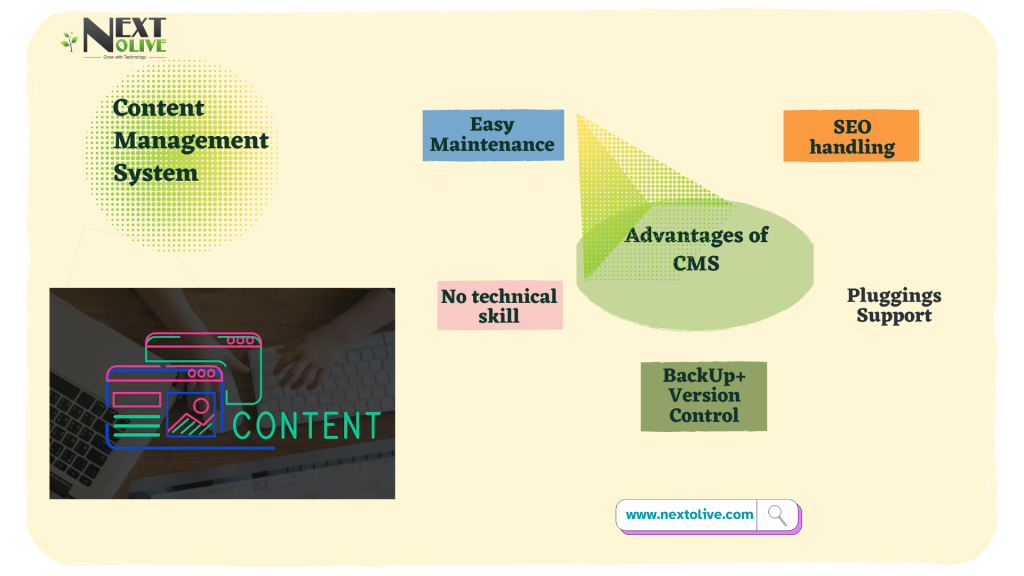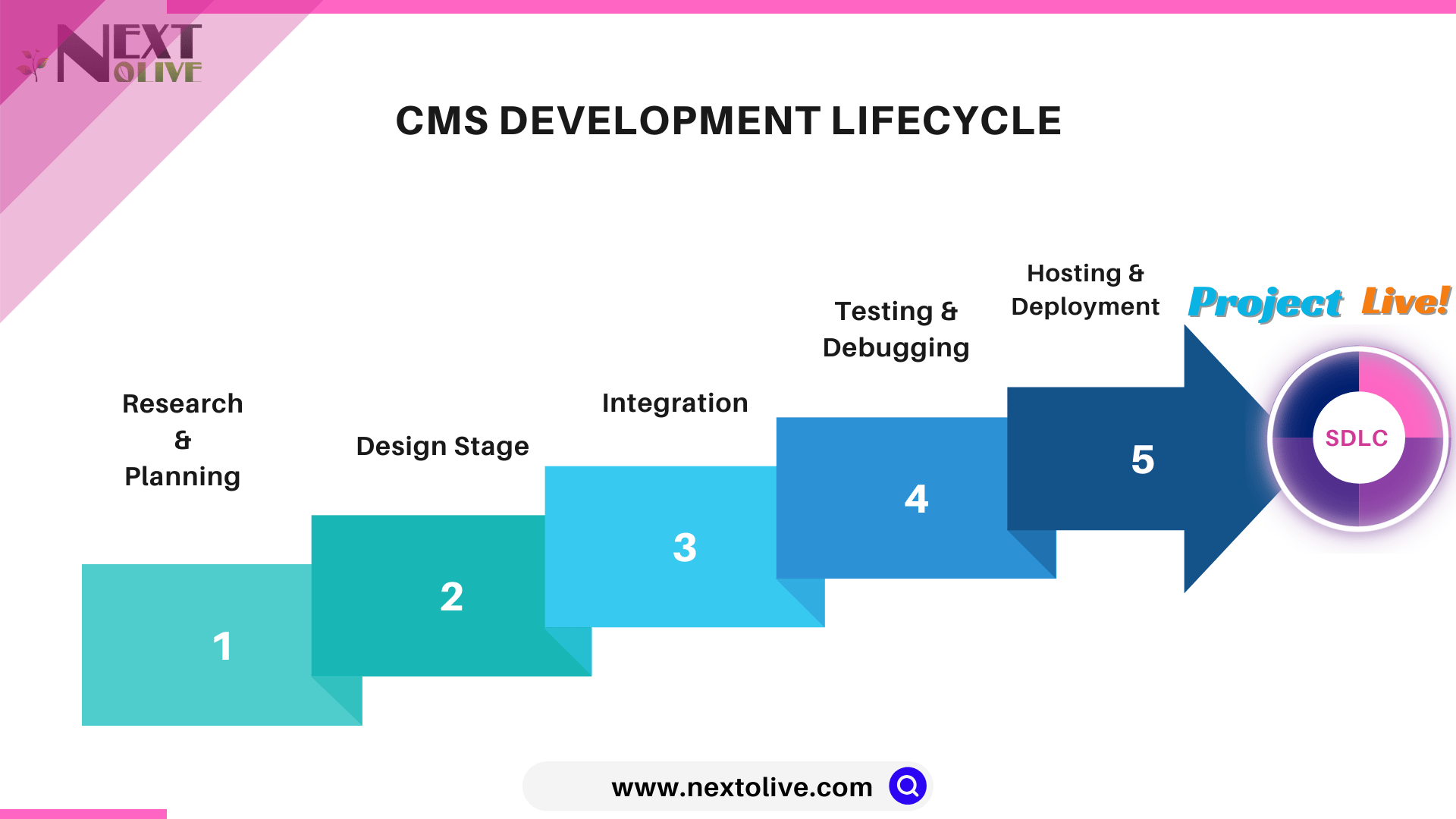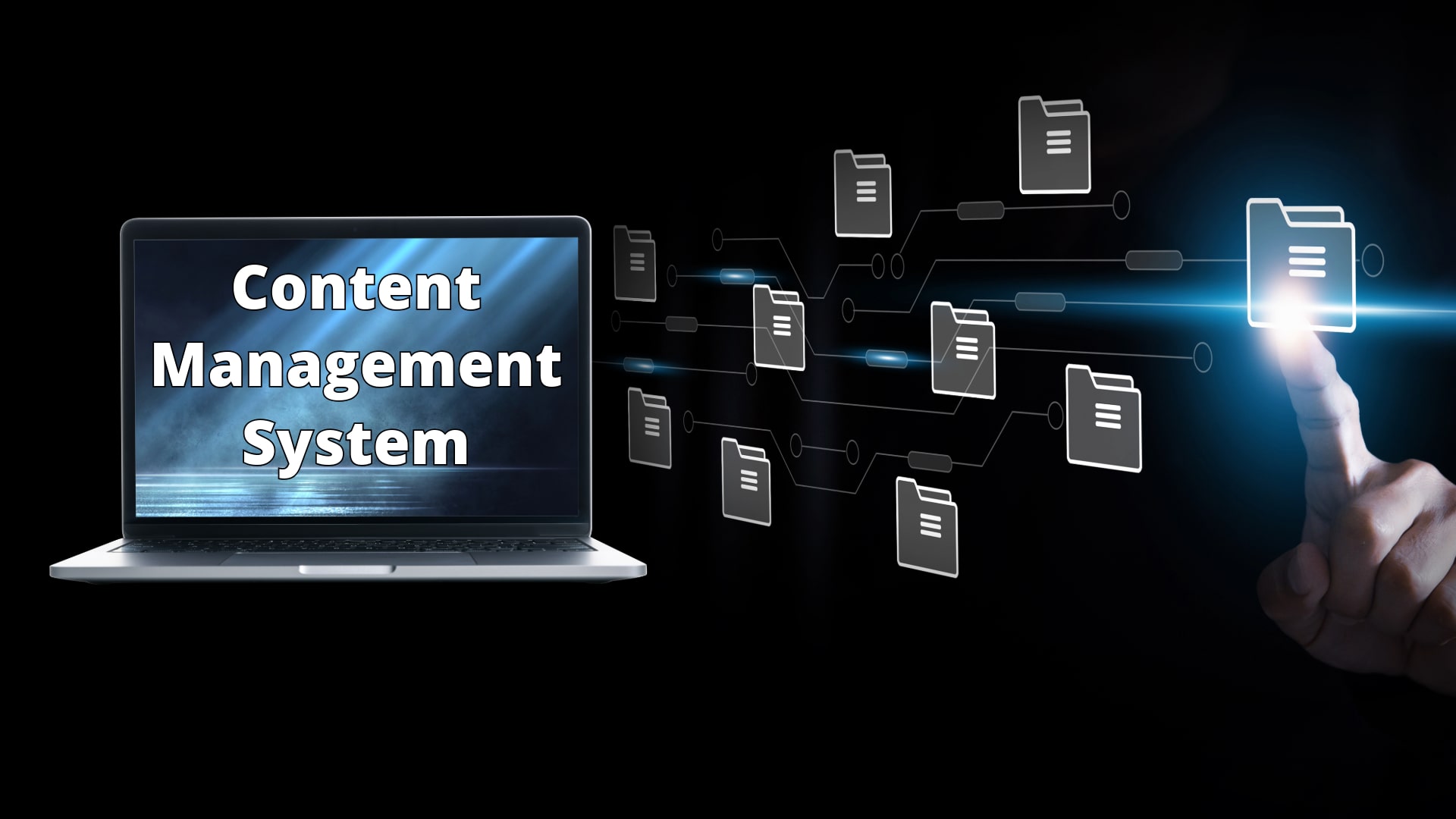A Full Guide for Content Management System(CMS) Development
You can assume that a CMS is a web application or app that oversees computerized content, permitting numerous supporters to edit, alter, and publish from a single dashboard.
Table of Contents
ToggleIf you want to construct a site(whether it’s an E-commerce or regular website), picking the right CMS (Satisfied Administration Situation) is fundamental. An open-source CMS permits you to write and deal with your site’s digital content without requiring specialized skills. The most amazing aspect? It’s free, and you can alter it any way you like.
What is CMS(Content Management System)?
Content Management Systems that do the following tasks: Centralized storage, Collaboration, real-time integration, Editing, and most importantly provide consistency. Their advanced tools including programming development stages, allow customers to oversee digitized content without specialization. CMS stages work on the most common way of making, altering, and publishing content on sites, forums, etc. A CMS is capable of all types of management likewise CMS manages all types of content, including text, pictures, and interactive media. Making it more straightforward for associations to keep up with their online presence and stay up with the latest.
The planning stage centers around making an easy-to-understand connection point and is versatile and adaptable to guarantee the CMS. During advancement, developers construct the CMS utilizing innovations that fit the venture’s necessities, like PHP, JavaScript, or Python and incorporate fundamental functionalities like substance endorsement work processes and Web optimization apparatuses. The organization stage remembers setting up the CMS for a live server, preparing clients, and offering progressing help. Compelling CMS improvement assists associations with smoothing out satisfied administration processes, upgrading client experience, and keeping a dynamic and drawing-in web-based presence.
All Essential Features for CMS
CMS development services give apparatuses that make it simpler for clients to deal with advanced content without requiring profound specialized information. These elements empower clients to oversee all that from webpage plans to content updates, guaranteeing a smoothed-out and effective work process for keeping a connection with a utilitarian site.
- Multiuser accessibility:
It gives job-based consent and work processes to help with cooperative substance creation. Different client jobs can be dealt out with unambiguous access levels, working with collaboration while keeping up with command over happy administration.
- Organization of content:
Devices for sorting and organizing content, like classifications, labels, and progressive menus, help in arranging data legitimately. This guarantees that clients can without much of a stretch find and oversee content on the site.
- Friendly Interface:
An instinctive dashboard permits simple administration of content, with clear editors for text, pictures, and interactive media. This component works on the substance creation process, making it open to clients without specialized mastery.
- Mobile Responsive:
Choices to make versatile sites that change per different screen sizes and gadgets. This guarantees a reliable client experience across work areas, tablets, and cell phones.
- Rich media scheduling:
Features for orchestrating and arranging content dissemination and updates. This allows clients to direct time-sensitive substances effectively and keep an anticipated movement of new information on the site.
- SEO advanced Tools:
Underlying or extendable instruments for enhancing content not only for users but also for web crawlers. These highlights assist with working on the permeability and positioning of the site, making it simpler for clients to view the substance.
- Detailed Analytics:
Information like your audience’s likes, dislikes, gadget use, and content connection, is vital to refining your substance procedure. A decent CMS ought to offer inherent investigation or coordinate with instruments like Google Analytics.
- Multi-language Content Creation:
This is a golden feature as it enables you to connect users globally. With clients across various nations, a CMS with multilingual help is fundamental. It streamlines making various language renditions of your pages.
- Publishing Controls:
Relegating various jobs and levels of access inside your CMS assists you with laying out a work process for making, supporting, and delivering different inventive resources. They likewise keep clients from performing activities on your site that they shouldn’t be.
- Responsive Templates:
When picking a CMS, consider its subject choices when making a predictable site plan. For web-based business, search for topics with drop-down routes, tacky sidebars, adjustable areas, and lattice designs.
- Support:
Boosting the security on your site doesn’t simply safeguard your information – it safeguards your valuable clients and your image notoriety. While assessing different substances in the board frameworks, consider what and how much work it will be for your group to accomplish your security principles.
- Migration:
You might be beginning your site without any plan. On the other hand, you might be bringing in enormous data on sites. For this situation, consider CMS with elements to assist with the interaction with minimal or no interference.
- Security:
This feature is highly concerned with the following
- How difficult is it to update the software?
- Does it come with a CDN?
- Is SSL included or not?
What worked in highlights the stage offers and how much work it will take for your group to accomplish your security guidelines.
Five Extraordinary Advantages of CMS

That time passed when “the marketing team had to rely upon investing major development resources to build a website. Custom CMS can enhance the beauty of your business by attracting massive user traffic on your website and increasing the conversion rate.
Easy Maintenance
CMS is typically utilized to create and run a site. With the assistance of this, even a non-tech individual can put content on a site and easily monitor it without any problem.
Plugins Support
It is a huge local area and gives an extensive variety of modules. It offers simplicity to the different entrepreneurs who are searching for a remarkable answer for their business.
SEO handling
Any website that is performing at the top of SERPs, will be optimized.CMS computerizes the URL for each page on your site. It ensures that the content will rank well in the web crawlers which will help in business Development.
No technical skill
Content over the site is the spirit of any site. It needs updates to stay new and refreshed. CMS permits you to make content utilizing a basic connection point with next to no problems.
BackUp+ Version Control
A decent CMS empowers organizations to make, alter, publish, and file the substance. A while later to circulated such refined information, and data rapidly and proficiently.
What is CMS Development?
CMS development includes developing, modifying, or keeping up with programming stages that permit clients to oversee computerized content without requiring top-to-bottom specialized abilities. A CMS empowers clients to construct and refresh sites, web journals, or applications utilizing a natural point of interaction instead of physically coding.
Generalized CMS Development:
- Ease of Use: Most CMS stages give an easy-to-use and user-friendly connection point, intuitive elements, and WYSIWYG (What You See Is What You Get) editors.
- Customization: CMS frameworks frequently incorporate subjects, modules, or modules that permit clients to tailor their site’s appearance and usefulness.
- Scalability: A CMS can scale from little web journals to huge endeavor stages relying upon the picked arrangement.
- Central Control: CMS gives instruments to make, alter, coordinate, and distribute content like articles, pictures, and recordings.
- Collaboration: Empowers numerous clients to chip away at content all the while with changing degrees of access control.
Specialized CMS Improvement:
- Frameworks and Programming: It’s a pure techie side of CMS development that utilizes structures like Laravel, Django, or Ruby on Rails, using dialects like PHP, Python, or JavaScript.
- Database Management: CMS stages oversee content in data sets like MySQL, PostgreSQL, or MongoDB.
Extensibility: Engineers can add usefulness through modules, expansions, or APIs to incorporate outsider apparatuses. - Responsive Design: Present-day CMS stages support responsive plans to guarantee sites work across gadgets.
- Security: Incorporates worked in highlights like verification, encryption, and job-based authorizations, frequently supplemented with outsider security modules.
Genuine Model: An urge to understand CMS
WordPress e-commerce website development
WordPress is a well-known open-source CMS that is generally utilized for different applications, including web-based businesses. For example, TechieGadgets a web-based gadgets retailer, utilized WordPress with the WooCommerce module to make a drawing in an internet-based store.
General Features: The CMS permits TechieGadgets to add items, oversee stock, and compose websites to draw in rush hour gridlock.
Specialized Integration: WooCommerce offers installment passages like PayPal and Stripe, item channels, and Website design enhancement apparatuses, making the webpage adaptable and productive.
This adaptability and usability are the reasons CMS advancement has turned into a fundamental piece of web improvement in current business scenes.
CMS Development Lifecycle:

Research & Planning :
This phase of building content management systems centers around understanding your business objectives, audience needs, and existing workflows. Key choices, for example, picking an innovation stack, defining highlight needs, and making an execution roadmap are made during this phase. At this stage, It means quite a bit to note that partner input is fundamental to guaranteeing the CMS lines up with business objectives.
Design Stage:
At this stage of development, CMS designers make versatile and modular, designing systems that permit consistent coordination of new highlights in the future. This stage ensures an engaging interface for the CMS’s users, is easy to use, and meets accessibility standards on every scale. Prototypes or MVPs are frequently created for stakeholder endorsement before continuing.
Integration:
The earlier stage of development implements core functionalities like creation tools.SEO features, wholesome publishing processes, and custom inbuilt integration with frameworks (similarly CRM, Google Analytics). Simulated artificial intelligence-driven personalization and constant large information investigation. Programming interface and plugins are likewise executed for extensibility, ensuring the CMS coordinates consistently with an existing system.
Testing & Debugging
A basic yet crucial move of this stage assures the CMS proceeds as expected in true situations usefulness, convenience, and execution. Comprehensive testing includes functionality testing, usability testing, and execution testing to ensure a seamless operational process, while load testing and security testing verify performance under stress and safeguard against vulnerabilities. By joining these testing endeavors, designers guarantee that the CMS is strong and dependable.
Hosting & Deployment
The CMS has been moved to a live server, which is prepared for individuals to utilize. This cycle incorporates setting up the site address so clients can track down it and adding SSL declarations to keep data completely safe. Client jobs and authorizations are likewise positioned to control who can get to and oversee various pieces of the CMS. These means ensure the CMS is not difficult to utilize, secure, and prepared for genuine use.
Training Session
It is mandatory for the client as training sessions are like instructional courses which makes business owners capable of maintaining workflow accordingly.
Moreover, comprehensive documentation, what’s more, training guides can be given to guarantee that clients can work the stage successfully. The human resources of the company make themselves more skilled and valuable assets throughout the session.
Optimization
Companies can achieve high rankings on search engine result pages. An optimized site has numerous advantages for business growth. A good CMS should have an in-built tool for SEO. Optimization is financially savvy by smoothing out processes and killing waste as you don’t need of SEO team. CMS guarantees frameworks are more responsive and dependable. Together, these characteristics make improvement fundamental for different fields.
Post Deployment Support
CMS development company usually provides support after the hosting of the applications. But it depends on the terms and conditions applied duration of NDA. After successfully hosting, post-maintenance support ensures, is up-to-date, and aligned with evolving start-up needs. Regular updates can keep your business ahead of the competition.
Tech Stack, We Rely Upon for CMS Development
Odoo
Shopware
Woocommerce
Magento
Akeneo
Salesforce
iOS
Android
Laravel
Symphony
How Do Content Management Systems Work?
The CMS isolates content from configuration, permitting clients to zero in on satisfaction while the framework handles the specialized parts of showing and managing the site.
1) Go with the right CMS
First, go with the detailed research of your business’s needs and along with the gathered requirements, make a most beneficial decision by selecting the right one by distinguishing your site’s objectives and specialized capabilities. WordPress is profoundly adaptable and easy to understand, making it reasonable for many sites, from online journals to internet businesses.
2) Hosting & Domain
Before you can begin, set your eyes on a domain name and web hosting. Domain relevancy is crucial in arrangements, including area enlistment, which smooths out the arrangement interaction. Many CMS providers offer hosting services like domain registration that smooth your business operations.
3) CMS installation
Introducing the CMS includes setting up the stage on your web server. Most facilitating suppliers offer robotized establishment instruments for famous CMS choices, which work on this cycle. Adhere to the directions given by your CMS.
This step commonly incorporates designing fundamental settings like the site’s name, managerial login certifications, etc.
4) Optimized Content and Custom Template
Adding SEO-optimized content is a significant stage in building your site. Begin by making and transferring fundamental substance, for example, pages, blog entries, pictures, and recordings. Make your business iconic by selecting a template that mirrors your enterprise’s image clearly. Layout permits you to make an outwardly engaging site that draws in clients.
5) Plugin installation
This fifth step enhances the core functionalities of your CMS by adding extensions. It comes with Social-media integration, SEO optimization, and E-commerce plugin tools, which guarantee that the modules you pick are viable with your CMS adaptation, and are all-around explored to stay away from execution issues.
6) Setting, Security, and Testing
Always keep away your website from cyber threats and other potential security risks. Carry out safety efforts to shield your site from expected dangers, for example, by SSL implementation and password protection methods(Auth(), 2F) for client accounts. Encrypted design and security rehearsal are indispensable for safeguarding your site’s information.
Why CMS is Essential for your business?
Market Size of Content Management System
According to Statista “The market is expected to show a yearly development rate (CAGR 2024-2029) of 4.90%, bringing about a market volume of US$28.00bn by 2029.” This ratio demonstrates the value of CMS.
Dropping a few genuine questions that are asking for CMS integration.
- Do we intend to extend our internet-based presence to different sites or microsites?
- Do we want a proficient method for overseeing and updating our site content without depending on specialized engineers?
- Do we have to publish, update, or chronicle content likewise web journals, articles, or item descriptions daily basis?
- Are we planning to sell products or services online and require e-commerce capabilities?
- Do we have to oversee inventories, payment gateways, and customer orders seamlessly?
- Could we at any point bear to employ a devoted engineer, or do we need a more cost-effective CMS solution?
Let’s explore, “Whether you’re making a corporate site, an internet business store( like Ajio store), or a blog, a CMS empowers you to control your site’s substance, plan, and usefulness without much knowledge of code. The CMS is laced with such a framework that can satisfy business needs.
To choose the best CMS for your business, you want to guarantee its elements line up with your requirements and objectives.
What are the top 15 CMS options available in the market?
- Craft CMS
- WordPress
- OpenCart
- Joomla Shika LMS
- Umbraco
- Drupal
- Kentico
- Contentful
- Hubspot
- Sitecore
- Webflow
- Wix
- TYPO3
- BigCommerce
- Adobe Experience Manager (AEM)
Your Tech-Partner Creating Iconic Products with Unparalleled CMS Services
Next Olive Advancements has given numerous incredible solutions for various enterprises and unicorns. With its excellent items, it has set a norm in many fields. Our excellent unparalleled services are known around the world. We have 12 years of involvement working with the best innovation.
Cloud-Based Content Management System
Cloud-based CMS arrangements, like Shopify, Wix, and Squarespace, are facilitated on the cloud and overseen by the specialist co-op. These frameworks offer comfort with their simple to-utilize interfaces and inherent facilitating, making them ideal for clients who favor a problem-free arrangement and upkeep experience.
Cloud-based CMSs frequently incorporate simplified usefulness, pre-planned layouts, and coordinated online business highlights. They give programmed updates and reinforcements, decreasing the requirement for specialized intercession. Be that as it may, they can be less adaptable contrasted with open-source and headless CMS stages and may accompany impediments concerning versatility and adaptability.
Open Source Content Management System
In the present quick-moving computerized scene, developing organizations are progressively wrecked by the enormous volume of advanced content that should be overseen day to day. From advertising groups making sites, virtual entertainment posts, and points of arrival to improvement groups keeping up with site usefulness and security, the interest in consistent coordination and effectiveness is more noteworthy than at any time in recent memory. This is where CMS (Content Administration Framework) incorporation becomes pivotal.
A CMS is all about an incorporated stage that improves on creation, altering, association, and distribution. By coordinating a CMS with other fundamental instruments — like CRMs for client relationships with the board, showcasing computerization stages, web-based business frameworks, and examination devices — organizations can smooth out work processes, diminish redundancies, and improve group cooperation. For example, promoting groups can utilize CMS mix to robotize posting plans, enhance content for Web optimization, and track crowd commitment measurements, while advancement groups can zero in on backend upgrades without disturbing substance conveyance.
Besides, CMS joining guarantees adaptability, permitting organizations to oversee developing substance requests as they venture into new business sectors or send off extra computerized channels.
Enterprise Content Management System
Venture CMS stages, like Episerver and Liferay, are intended for huge associations with complex substances the board needs. These frameworks offer broad highlights, including progressed client consent, work process with the board, and content personalization. They are worked to deal with enormous volumes of content and backing multi-site and multi-language conditions.
Venture CMS arrangements frequently incorporate other undertaking frameworks, like Client Relationship The executives (CRM) and Endeavor Asset Arranging (ERP Development) frameworks. They give elevated degrees of safety, versatility, and support yet normally include huge speculation and customization. Their strong capabilities and mixed abilities make them reasonable for enormous-scope ventures with assorted and complex substance necessities.
Custom-Built CMS: Designed Just for You
A custom-built CMS furnishes a graphical UI with devices to make, alter, and publish web content without the coder’s help.
While there are many kinds of content administration frameworks(CMS), there are just two significant sorts in the market that can be effectively referred to, and those are:
Conventional CMS like WordPress, Drupal, and so forth and
Headless CMS like Strapi, Netlify, Directus, and so forth.
what is a Headless CMS?
The head is the result and the body is where the substance is put away and created. Headless CMS doesn’t imply that we needn’t bother with a head however, we can have various heads and change them at whatever point we need without the need of re-writing the substance. Hence, Next Olive, do the advancement according to the necessity of the business.
CMS Migration
CMS migration plays a significant part in guaranteeing a smooth change starting with one stage and then onto the next. Information movement is a basic move toward this interaction, requiring cautious preparation and execution. It starts with surveying the current information to figure out its construction and quality. Then, planning and change are performed to adjust the old information design with the prerequisites of the new CMS. A blend of mechanized devices and manual movement methods guarantees precision and proficiency during the exchange. At long last, extensive quality checks are directed to confirm information honesty and usefulness, guaranteeing a consistent change to the new framework. Next Olive additionally gives you arrangements that permit simple Business Interaction The board for you.
Traditional Vs Headless CMS
Traditional CMS typically relies on specialized frameworks and programming languages, yet it requires minimal technical expertise for everyday use. It offers a robust set of front-end and content management features but is less scalable due to stringent security demands. In contrast, a Headless CMS gives developers more flexibility, as they can choose from various frameworks and leverage APIs to manage content. This architecture is highly scalable, though it requires a team of developers to merge a complete website. While Headless CMS excels at delivering content to multiple channels, it focuses primarily on back-end management, which can be seen as less comprehensive compared to the all-in-one nature of a traditional CMS.
The Future of CMS Technology
The future of CMS development is as shiny and broad as the sky. With a persistent approach, CMS developments continuously adopting changes, like innovations of headless CMS, artificial intelligence (AI), and Web 3.0 are welcome changes, leading the markets globally. In an earlier stage of CMS development, general CMS platforms were easy to use and helpful for both developers and SEO engineers. As mobile devices, smart gadgets, and modern front-end technologies like React and Angular became more popular, they paved the way for the development of headless CMS platforms.
These systems give more flexibility but still work to keep content editing simple. Now, AI and Web 3.0 are taking CMS platforms even further, making them smarter, faster, and more secure for everyone.
- However the ascent of cell phones, IoT, and present-day front-end systems like Respond and Precise brought forth headless CMS. While early headless CMSs forfeited content altering for adaptability, the cutting edge reestablished instinctive substance the board, mixing the smartest possible situation.
- Computer-based intelligence is molding the eventual fate of CMS by empowering highlights like robotized content classification, customized client encounters, continuous Web optimization ideas, and more intelligent picture labeling.
- If we delve Web 3.0, based on decentralized blockchain innovation, is on another level. It tends to security issues in Web 2.0 by presenting open, secure information sources and disposing of outsider control. This enables CMS stages to use decentralized networks for quicker satisfied conveyance, cost investment funds, and imaginative promoting procedures.
Cost to Develop a CMS
CMS programming improvement requires careful thought of the specific necessities or functionalities. CMS development costs almost depend on the customization, scalability, and combinations required. Here is an expected breakdown of CMS programming improvement costs across three levels complex, basic, and high-level CMS.
Category | Cost Estimation |
Basic CMS Platform | $1000-$25000 |
Complex | $25000-$70,000 |
Advance CMS | $70,000-$2,00000 |
Frequently asked questions (FAQs)
Reach out to us(a custom cms development company), we have a team of top cms developers(likewise: Joomla dev, drupal developers, Umbraco developers, and HubSpot cms developers). Drop a mail to us at sales@nextolive.com.
Yes, our custom cms development services are cost-effective and reliable.
- The adaptability of support, including refreshes
- Adaptability to make static and dynamic pages
- Content administration adaptability
- Adaptability to utilize progressed instruments and modules
- Incorporate anything you want for your site.
Yes, we do all types of custom CMS development. Our frontend developers are creating website cms designs that are easy to use without any tech skills.
The best CMS relies upon your requirements, yet here are the top choices:
WordPress: The most famous, adaptable, and versatile CMS. Incredible for online journals, organizations, and internet businesses. Modules like Next3 Offload make it far better by upgrading media with distributed storage.
Shopify: Ideal for web-based business. Easy to utilize yet less adjustable.
Wix/Squarespace: Ideal for novices and creatives with little tasks.
Drupal: Best for cutting-edge clients requiring high security and versatility.
For most clients, WordPress stands apart because of its adaptability and immense environment.








